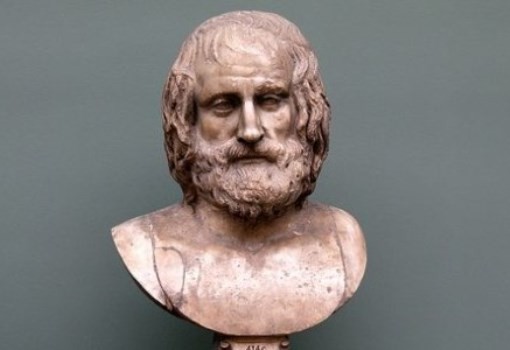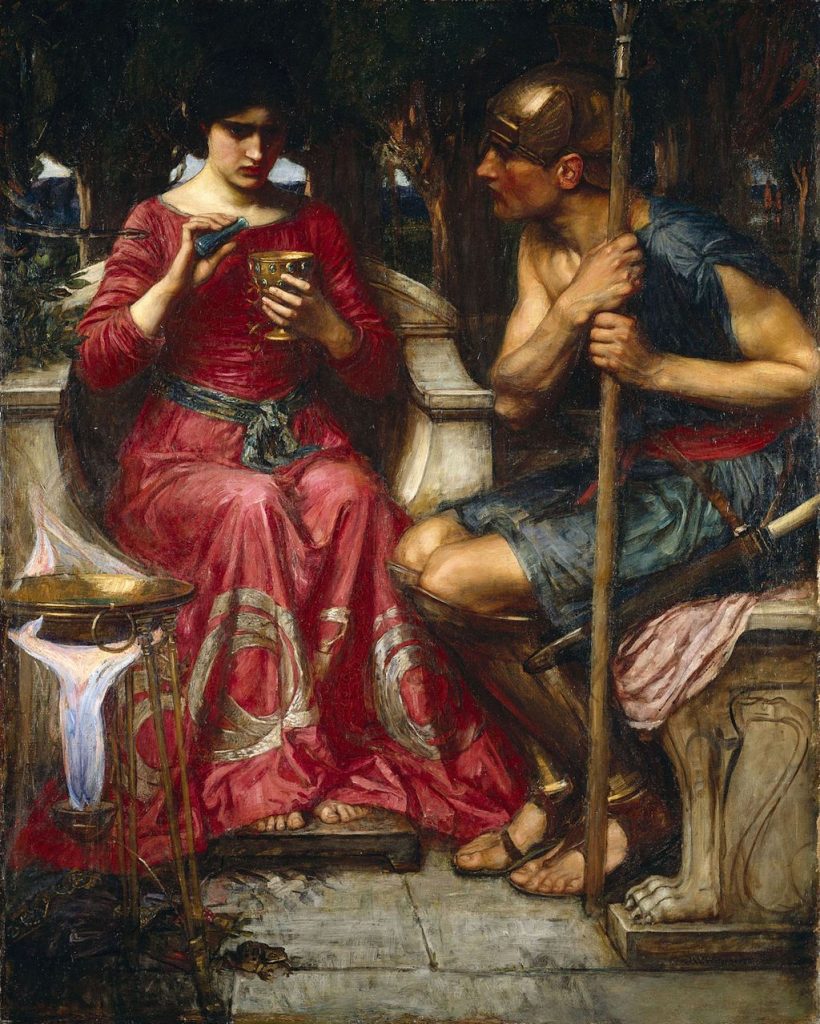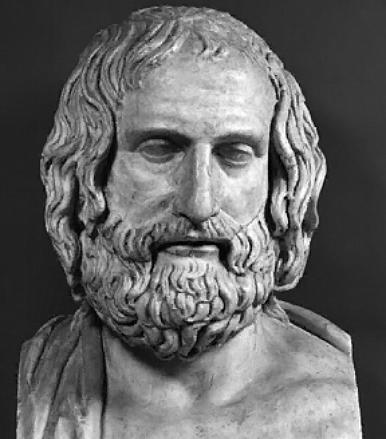By Eldar Balta, Contributing Writer, Classical Wisdom
Euripides’ Early life
Born on Salamis Island in 480 BC to mother Cleito and father Mnesarchus, Euripides’ destiny was foretold in a prophecy given to his father. The Oracle fated that Euripides would one day hold the “crowns of victory”. Mnesarchus did not lose any time insisting that his son take on sports and athleticism, firmly believing that reaching fame in those fields was the boy’s destiny.
In the end, Euripides did crown himself with victories… but far from the track and combat fields.

Bust of Euripides
Euripides’ Career
Euripides led an introverted life and suffered two failed, unfaithful marriages to Melite and Choerine, with the latter bearing him three sons. Eventually he became a recluse and moved to the depths of
The Cave of Euripides, a ten-chamber hole in the rock overlooking the Saronic Gulf. He spent most of his days there, collecting books, restless thoughts and writing accounts of his own life, or a perception of it, through his dark heroes and human-like Gods. There he produced notable tragedies such as:
Medea, 431 BC,
Hippolytus, 428 BC,
Electra, c. 420 BC,
The Trojan Women, c. 415 BC, and
Bacchae, 405 BC.
Euripides was the youngest of the three most famous Greek tragedians:
Aeschylus, Sophocles and himself. Having in mind that they all were pretty much contemporaries, the rivalry, whether direct or perceived as one from the audience, existed then as it does today.

The Cave of Euripides
Critical of Athens
Euripides lived in between two important wars. The first one was where Athens won against Persia at the
Battle of Salamis, an important twist in the Greco-Persian wars. The second, which he did not live to see, was the fall of Athens under Sparta, a huge defeat in the Peloponnesian wars.
It is for this reason the works of the
three tragedians looked upon Athens so differently. Aeschylus was a hero at the battle of Salamis, Sophocles was old enough to witness it and feel the patriotism as a result of the victory, while Euripides was born on the day of the battle. This timeframe made his views differ widely from his older colleagues.
Unlike Aeschylus and Sophocles, Euripides was a huge critic of Athens’ senseless heists and wars. And because of this, as well as his other views on Athens, Euripides was highly criticized. Ironically, the Spartans who planned the demolition of Athens and the enslavement of its people, grew merciful after being entertained at a banquet by scenes from Euripides’ play Electra. “They felt that it would be a barbarous act to annihilate a city which produced such men”, (Plutarch, Life of Lysander).
Euripides was a contemporary of Socrates,
the philosopher sentenced to death for his critical views on Athenian democracy. Euripides was a man whose own perception of Athens was not far from Socrates’ and both of them were viewed as decadent intellectuals. There are some indications that say that Socrates was even one of the co-authors of Euripides’ plays. This explains why Athenians watched Euripides seriously, but never fully accepted his views. Perhaps, it’s no wonder why Euripides exiled himself to Macedonia at the decline of his life.

The death of Socrates
An excerpt from Aristophanes’ The Frogs and Other Plays (translated by David Barret) illustrates this:
“They sit at the feet of Socrates
Till they can’t distinguish the wood from the trees,
And tragedy goes to pot;
They don’t care whether their plays are art
But only whether the words are smart;
They waste our time with quibbles and quarrels,
Destroying our patience as well as our morals,
And making us all talk rot.”
In fact, Euripides became the main fodder for comedians. Euripides, unlike Aeschylus or Sophocles, didn’t have any other job. He was a true tragedian, a dark comedian and a critic of society. Being fully aware of the consequences, Euripides chose not to comply, but rather, to continue.
However, Comedy and Tragedy live in symbiosis and without that critical, opportunistic complex, without Aristophanes mocking Euripides, we may have not heard of either of them.
Work and Achievements
Euripides introduced twists into drama, something that influenced tragedy, as well as comedy, for ages to come. He did this while exploring his characters’ feelings, their relationships and acts. He did not constrain himself, which allowed him to make breathtaking twists, teaching people to babble, to think, to see, to understand, to love, to contrive, to suspect all and consider things from every angle. Euripides’ sophistry, atheism, and immoral relativism was considered by Aristophanes as a corruption by the Athenians.
A perfect example of this is Euripides’ treatment of Medea. In some versions, the citizens of Corinth murder the children. In others, Medea accidentally kills her children. Euripides, however, decides to take it two steps further by making the mother purposefully murder her young after poisoning
Jason’s new bride. Euripides’ invention of Medea’s filicide went on to become the standard.

Jason and Medea – as depicted by John William Waterhouse, 1907
Euripides was a fruitful writer, producing more than 92 plays in his life. He was awarded five first prizes in festivals, while Sophocles won 24, and Aeschylus 13. Still, more of Euripides’ works were preserved than the other two writers combined, proving his posthumous influence.
Euripides became one of the cornerstones of ancient literary education in the Hellenistic period, along with Homer, Demosthenes, and Menander. Eventually, “It was Euripides, not Aeschylus or Sophocles, whose tragic muse presided over the rebirth of tragedy in Renaissance Europe.”
Euripides’ Death
Euripides died at the age of 74 (406 BC) in Macedonia after choosing a life of exile from Athens at the court of King Archelaus of Macedonia. This was never fully confirmed, however, and it is possible that he never visited Macedonia at all.
Nevertheless, we are dedicating our time to the master of twists, so we will add here one dark version of Euripides’ death from the mouths of the oldest Macedonian storytellers (Diodor):
“Euripides died in the following manner. There was a town in Macedonia called the village of the Thracians because Thracians had once settled there. At some point, a female Molossian hound belonging to Archelaus had strayed into the village. This dog the Thracians, as is their custom, sacrificed and ate. Accordingly, Archelaus fined them one talent. Since they did not have the money, they asked Euripides to get them released from their debt to the king.
Sometime later, when Euripides was resting by himself in a grove near the city and Archelaus came out to hunt, his dogs were released by their keepers and fell on Euripides. The poet was torn to shreds and eaten.
These dogs were the descendants of the dog that was killed by the Thracians. This is the origin of the Macedonian proverb, “a dog’s justice”.”

Bust of Euripides
Euripides’ Legacy
Maybe the best way to summarize his Euripides’ legacy will be by using the words of Bernard MacGregor Walker Knox, an English classicist, author, and critic who was the first director of the Center for Hellenic Studies in Washington D.C., USA:
“He was a problem to his contemporaries and he is one still; over the course of centuries since his plays were first produced he has been hailed or indicted under a bewildering variety of labels.
He has been described as ‘the poet of the Greek enlightenment’ and also as ‘Euripides the irrationalist’; as a religious skeptic if not an atheist, but on the other hand, as a believer in divine providence and the ultimate justice of divine dispensation.
He has been seen as a profound explorer of human psychology and also a rhetorical poet who subordinated consistency of character to verbal effect; as a misogynist and a feminist; as a realist who brought the tragic action down to the level of everyday life and as a romantic poet who chose unusual myths and exotic settings.
He wrote plays which have been widely understood as patriotic pieces supporting Athens’ war against Sparta and others which many have taken as the work of the anti-war dramatist par excellence, even as attacks on Athenian imperialism.
He has been recognized as the precursor of New Comedy and also what Aristotle called him: ‘the most tragic of poets’. And not one of these descriptions is entirely false.”














No comments
Trackbacks
Our apologies, you must be logged in to post a comment.